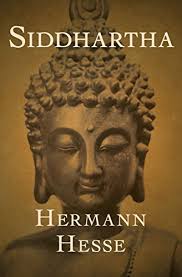Siddhartha Page #10
Siddhartha is a novel by Hermann Hesse that deals with the spiritual journey of self-discovery of a man named Siddhartha during the time of the Gautama Buddha. The book, Hesse's ninth novel, was written in German, in a simple, lyrical style.
In the night when he slept in the straw hut of a ferryman by the river, Siddhartha had a dream: Govinda was standing in front of him, dressed in the yellow robe of an ascetic. Sad was how Govinda looked like, sadly he asked: Why have you forsaken me? At this, he embraced Govinda, wrapped his arms around him, and as he was pulling him close to his chest and kissed him, it was not Govinda any more, but a woman, and a full breast popped out of the woman's dress, at which Siddhartha lay and drank, sweetly and strongly tasted the milk from this breast. It tasted of woman and man, of sun and forest, of animal and flower, of every fruit, of every joyful desire. It intoxicated him and rendered him unconscious.--When Siddhartha woke up, the pale river shimmered through the door of the hut, and in the forest, a dark call of an owl resounded deeply and pleasantly. When the day began, Siddhartha asked his host, the ferryman, to get him across the river. The ferryman got him across the river on his bamboo-raft, the wide water shimmered reddishly in the light of the morning. "This is a beautiful river," he said to his companion. "Yes," said the ferryman, "a very beautiful river, I love it more than anything. Often I have listened to it, often I have looked into its eyes, and always I have learned from it. Much can be learned from a river." "I thank you, my benefactor," spoke Siddhartha, disembarking on the other side of the river. "I have no gift I could give you for your hospitality, my dear, and also no payment for your work. I am a man without a home, a son of a Brahman and a Samana." "I did see it," spoke the ferryman, "and I haven't expected any payment from you and no gift which would be the custom for guests to bear. You will give me the gift another time." "Do you think so?" asked Siddhartha amusedly. "Surely. This too, I have learned from the river: everything is coming back! You too, Samana, will come back. Now farewell! Let your friendship be my reward. Commemorate me, when you'll make offerings to the gods." Smiling, they parted. Smiling, Siddhartha was happy about the friendship and the kindness of the ferryman. "He is like Govinda," he thought with a smile, "all I meet on my path are like Govinda. All are thankful, though they are the ones who would have a right to receive thanks. All are submissive, all would like to be friends, like to obey, think little. Like children are all people." At about noon, he came through a village. In front of the mud cottages, children were rolling about in the street, were playing with pumpkin-seeds and sea-shells, screamed and wrestled, but they all timidly fled from the unknown Samana. In the end of the village, the path led through a stream, and by the side of the stream, a young woman was kneeling and washing clothes. When Siddhartha greeted her, she lifted her head and looked up to him with a smile, so that he saw the white in her eyes glistening. He called out a blessing to her, as it is the custom among travellers, and asked how far he still had to go to reach the large city. Then she got up and came to him, beautifully her wet mouth was shimmering in her young face. She exchanged humorous banter with him, asked whether he had eaten already, and whether it was true that the Samanas slept alone in the forest at night and were not allowed to have any women with them. While talking, she put her left foot on his right one and made a movement as a woman does who would want to initiate that kind of sexual pleasure with a man, which the textbooks call "climbing a tree". Siddhartha felt his blood heating up, and since in this moment he had to think of his dream again, he bend slightly down to the woman and kissed with his lips the brown nipple of her breast. Looking up, he saw her face smiling full of lust and her eyes, with contracted pupils, begging with desire. Siddhartha also felt desire and felt the source of his sexuality moving; but since he had never touched a woman before, he hesitated for a moment, while his hands were already prepared to reach out for her. And in this moment he heard, shuddering with awe, the voice if his innermost self, and this voice said No. Then, all charms disappeared from the young woman's smiling face, he no longer saw anything else but the damp glance of a female animal in heat. Politely, he petted her cheek, turned away from her and disappeared away from the disappointed woman with light steps into the bamboo-wood. On this day, he reached the large city before the evening, and was happy, for he felt the need to be among people. For a long time, he had lived in the forests, and the straw hut of the ferryman, in which he had slept that night, had been the first roof for a long time he has had over his head. Before the city, in a beautifully fenced grove, the traveller came across a small group of servants, both male and female, carrying baskets. In their midst, carried by four servants in an ornamental sedan-chair, sat a woman, the mistress, on red pillows under a colourful canopy. Siddhartha stopped at the entrance to the pleasure-garden and watched the parade, saw the servants, the maids, the baskets, saw the sedan-chair and saw the lady in it. Under black hair, which made to tower high on her head, he saw a very fair, very delicate, very smart face, a brightly red mouth, like a freshly cracked fig, eyebrows which were well tended and painted in a high arch, smart and watchful dark eyes, a clear, tall neck rising from a green and golden garment, resting fair hands, long and thin, with wide golden bracelets over the wrists.
Translation
Translate and read this book in other languages:
Select another language:
- - Select -
- 简体中文 (Chinese - Simplified)
- 繁體中文 (Chinese - Traditional)
- Español (Spanish)
- Esperanto (Esperanto)
- 日本語 (Japanese)
- Português (Portuguese)
- Deutsch (German)
- العربية (Arabic)
- Français (French)
- Русский (Russian)
- ಕನ್ನಡ (Kannada)
- 한국어 (Korean)
- עברית (Hebrew)
- Gaeilge (Irish)
- Українська (Ukrainian)
- اردو (Urdu)
- Magyar (Hungarian)
- मानक हिन्दी (Hindi)
- Indonesia (Indonesian)
- Italiano (Italian)
- தமிழ் (Tamil)
- Türkçe (Turkish)
- తెలుగు (Telugu)
- ภาษาไทย (Thai)
- Tiếng Việt (Vietnamese)
- Čeština (Czech)
- Polski (Polish)
- Bahasa Indonesia (Indonesian)
- Românește (Romanian)
- Nederlands (Dutch)
- Ελληνικά (Greek)
- Latinum (Latin)
- Svenska (Swedish)
- Dansk (Danish)
- Suomi (Finnish)
- فارسی (Persian)
- ייִדיש (Yiddish)
- հայերեն (Armenian)
- Norsk (Norwegian)
- English (English)
Citation
Use the citation below to add this book to your bibliography:
Style:MLAChicagoAPA
"Siddhartha Books." Literature.com. STANDS4 LLC, 2024. Web. 23 Dec. 2024. <https://www.literature.com/book/siddhartha_24>.




Discuss this Siddhartha book with the community:
Report Comment
We're doing our best to make sure our content is useful, accurate and safe.
If by any chance you spot an inappropriate comment while navigating through our website please use this form to let us know, and we'll take care of it shortly.
Attachment
You need to be logged in to favorite.
Log In